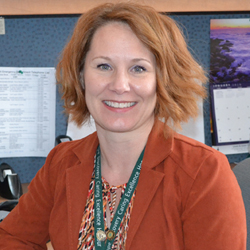In the Spotlight
Carol Legare, RN, MN, ENC ©
 Director of Patient Services for the Emergency Program at Health Sciences Centre, Winnipeg
Director of Patient Services for the Emergency Program at Health Sciences Centre, Winnipeg
"It's very rewarding to build other people up and support them in being their best."
Carol Legare graduated from the Health Sciences Centre School of Nursing and started her nursing career working in women's health. She has also worked in surgery and it was her work in children's emergency that sparked a passion for emergency department nursing. Carol has been working in the adult emergency department for the past 15 years in a variety of capacities - including staff nurse, clinical resource nurse, department educator and department manager. During this time, she not only finished her Bachelor of Nursing, she also completed her Master's Degree in Nursing. She is now the Director of Patient Services for the Emergency Program at Health Sciences Centre, Winnipeg. Both the adult emergency and Sexual Assault Nurse Examiners program are in her portfolio.
What was it about the emergency department that spoke to you?
It was a fit. The environment and my personality are a good fit.
I'm not a type A person. The emergency department (ED) provides exposure to a large variety of situations and ones that are always different. It's a privilege to have the opportunity to be part of a patient's life for any reason they present to ED It's the only place in nursing where you can see everyone for any reason.
What inspired you to pursue leadership?
I started in an acting director role in April 2014. Management was just one of those things I never thought I'd do . . . but never say never.
What self-care practices do you have in place?
I think it's important to have you priorities straight. If your priority is your health, or your family, put that first.
And if you need to talk, find someone to talk to.
What is one thing you've learned over the years?
I'm learning all the time - it's all about learning. Life hands you an opportunity, use it as a learning moment. It can either be the school of hard knocks or you can receive validation for a good decision you've made. Either way, you're learning.
Deep breath. Over the years I've learned to use a 48 hour cooling off period so you can think through things impartially.
One big thing I've learned is own up when you've messed up.
What is a typical day like?
I usually check my BlackBerry at 6:00 am before heading into work for 7:00 am. Once I'm there, I'll take a look at my calendar and check EDIS to get an overview of things in the ED.
I like to get to the ED in the morning and try to time it for when the team does their huddle. If the ED has lots of patients, I connect with the directors of med/surg and executives to see what we can do about patient flow.
After that, I spend much of my day in meetings (with different people for different reasons), following up on projects, writing briefing notes, project work or looking at operational elements. Every day can also have "emergency" things that come up - media inquiries, government questions, complaints to address.
I'm a very organized person, so the last thing I do before leaving is get my files ready for the next day's meetings.
What are your reflections on nursing?
Nursing gives you the ability to do whatever you want to do. The ripple effect each nurse has can be pretty powerful, and infinite. We can use that impact to build people up and support them for the best. As we grow as nurses, it's a good thing because there are so many things we can do.
What are you proud of?
I'm fortunate to have this position. I have a phenomenal boss and leadership supports. This position suits my personality more than any other I've ever had.
The HSC ED staff work 12 hour shifts. They work long hours in a very busy environment to provide the best care for any patient. I think they are the hardest working staff and it humbles me to watch them.
I'm also really proud of Karen Samson and Todd Torfason, the ED managers, and how we work as a team.
It's very rewarding to build other people up and support them in being their best.
How do you process stress?
I put things in perspective. Are you bleeding? Are bones broken or protruding? Are you blue? If not, move on!
What has had a profound influence on your nursing practice?
There were two front-line nurses in the children's and adult emergency departments. Those two combined were definitely a role model for me.
I've had a chance to learn from every boss I've had. Some I learned good things from, but sometimes I learned what not to do.
What are your reflections on nursing?
Whether it's the Experience Change model or my career, you can't accomplish anything without a good team. Day to day you have to be a role model. Work with the people around you and in your team to accomplish goals.
